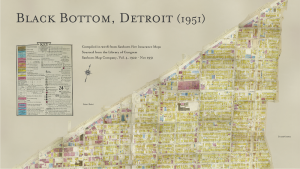Presented By: Department of History
History & Healing: Reparations and Repair in Detroit & Beyond
Marcia Black, Lauren Hood, Baba Cheikh Mbacké

How do we maintain and encourage an authentic commitment to AfroUrbanism by utilizing the knowledge to be found in resources such as storytelling, oral histories, and archives that center the lived experiences of Black peoples? How do projects like the Black Bottom Archives and the Friends of Royal Oak Township’s Truth Toward Reconciliation initiative help us think about the possibilities of reparations as a form of remembrance and healing?
Program
Welcome and Introductions:
Bénédicte Boisseron
Chair, Department of Afroamerican and African Studies
Professor, Afroamerican and African Studies
University of Michigan
Opening Remarks and Framing:
Angela D. Dillard (moderator)|
Vice Provost of Undergraduate Education
Richard A. Meisler Collegiate Professor of Afroamerican and African Studies and in the Residential College
University of Michigan
Reflections:
Lauren Hood
Founder/Director, Institute for AfroUrbanism
Associate Professor of Practice in Urban and Regional Planning
A. Alfred Taubman College of Architecture and Urban Planning
University of Michigan
Marcia Black
Director, Black Bottom Archives
Baba Cheikh Mbacké
Co-Founder, Friends of Royal Oak Township
Preceded by four-minute except of film, A Tale of Ten Cities
Panel Discussion and Q&A
Closing Remarks:
John Carson
Director, Eisenberg Institute for Historical Studies
Associate Professor, History
University of Michigan
This event is presented by the Department of Afroamerican and African Studies, Department of History, and Eisenberg Institute for Historical Studies. Additional support from the Kalt Fund for African American and African History.
Program
Welcome and Introductions:
Bénédicte Boisseron
Chair, Department of Afroamerican and African Studies
Professor, Afroamerican and African Studies
University of Michigan
Opening Remarks and Framing:
Angela D. Dillard (moderator)|
Vice Provost of Undergraduate Education
Richard A. Meisler Collegiate Professor of Afroamerican and African Studies and in the Residential College
University of Michigan
Reflections:
Lauren Hood
Founder/Director, Institute for AfroUrbanism
Associate Professor of Practice in Urban and Regional Planning
A. Alfred Taubman College of Architecture and Urban Planning
University of Michigan
Marcia Black
Director, Black Bottom Archives
Baba Cheikh Mbacké
Co-Founder, Friends of Royal Oak Township
Preceded by four-minute except of film, A Tale of Ten Cities
Panel Discussion and Q&A
Closing Remarks:
John Carson
Director, Eisenberg Institute for Historical Studies
Associate Professor, History
University of Michigan
This event is presented by the Department of Afroamerican and African Studies, Department of History, and Eisenberg Institute for Historical Studies. Additional support from the Kalt Fund for African American and African History.